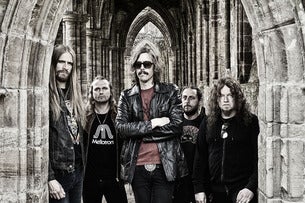Reluctant Martyr
Opeth's 25 year evolution

"I have avoided a bunch of interviews throughout the last couple of months, much to the despair of the people who work with us,” Mikael Åkerfeldt grumbles. He’s a perfectly affable fellow otherwise, he’s just not happy to be doing interviews right now. “[The label] always asks, ‘Can you do this or that?’ and now I’ve started saying no and they’re not so happy about that.”
But Åkerfeldt’s reticence towards the press doesn’t seem to stem from any sense of rock star entitlement – he breaks from our conversation at one point to take care of his kid – rather, the frontman seems uninterested in explaining why Opeth aren’t really interested in writing more death metal albums.
“We’re getting so much flak for not being metal enough. But it’s like we’ve been playing metal, all the really heavy songs in the back catalogue… I played them a week ago, y’know. And I’ve been playing it since I was 16 in this band, and I’ve been listening to heavy metal since I was six or seven years old, so I think I kind of know what I’m doing.”
"A certain part of me is surprised that people think it’s strange that we’ve had an evolution in 25 years."
With Pale Communion, Opeth continue down the weird, progressive path forged on Watershed and cemented on Heritage. It’s just as involving as your typical death metal record; the nuanced production and musicianship require the same level of commitment from listeners, and also offer the same level of reward for those who stay the course. That’s what Åkerfeldt thinks Opeth is all about now. Doing different and exciting things. He just can’t seem to understand why the metal community expects the band to do anything different to that. “A certain part of me is surprised that people think it’s strange that we’ve had an evolution in 25 years. ‘Why don’t you sound the same?’ they ask. But for me it’s like with those 25 years and god knows how many members, it’s only natural that we’d change. It’s more weird to me when bands sound exactly the same after 25 years. You’re bound to get a lot of people telling you to do this and that. To repeat this record or do things the same, but it doesn’t work like that. It’s irrational thinking along those lines.”
Don't miss a beat with our FREE daily newsletter
So then how much of Opeth’s sound today is simply a reaction to those types of questions? How much of Pale Communion came to be because metal geeks kept asking for more of the brutalz?
“I hate being told what to do. I do. But I wouldn’t come up with an idea for our creative future based on doing whatever people have told us not to do. But at the same time I’m going to not want to do whatever somebody tells me to do. I’m just going to write what I think is interesting.”
And that seems to be the crux of why Åkerfeldt is so reluctant to be taking interviews right now. He has trouble justifying what Opeth are doing, what they have done and what they will do in the future. The band is a truly creative and artistic enterprise, and art and creativity are quixotic.
“I’ve learnt talking about future plans, creative plans and writing music is like putting boundaries on yourself. I mean, it sounds like a good idea but once you sit down and write I don’t want to be restricted to any idea, even if it is a great idea. So if we say, ‘We’re going to make a really heavy record,’ which is something I’ve said many, many times… ‘The next one is going to be a heavy record,’ I’ve said it a million times. And then it usually ends up being something else. Before we did Heritage I said that it was going to be a heavy record, and people are thinking it’s going to be a death metal record, and it obviously wasn’t.”
Going forward, now that Opeth have nurtured Pale Communion into the world, Åkerfeldt doesn’t want to put any limitations on what Opeth will do next. He doesn’t know what he will do to follow up this record. “It’s interesting to see where we’re taking this ship. And now it’s like, ‘Okay, what’s happening next time?’ Because one of the great things about being in Opeth is that I don’t really know what we are today. And that’s fantastic. We’re some kind of rock band but then sometimes we’re a death metal band and then in some parts we’re something else. And for me, as a songwriter, that’s a really nice position to be in. I feel like I can kind of do pretty much everything and it’s going to be Opeth. I’m only restricted by the limitations of my own taste.”
Related Gigs











